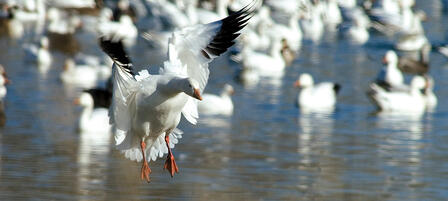Why You Should Hunt The Light Goose Conservation Order

PRATT – While making memories and enjoying healthy meat that rivals even the best “free range” option are reasons to enjoy the Light Goose Conservation Order, there is a greater benefit to this special season that hunters may not be aware of – saving birds. The Light Goose Conservation Order, Feb. 19-April 30, 2018, is a unique, federally-authorized season designed to increase harvest of overabundant “light” geese (Ross’ geese, and both lesser and greater snow geese). Though some may see it just as an opportunity for goose hunters to stay afield a little longer (which certainly is a plus), the season was established to control the extraordinary numbers of light geese that have denuded portions of their fragile arctic tundra breeding habitat. The damage caused, which may take decades to recover, impacts more than just the geese, too – other bird species nest there, including semi-palmated sandpipers and red-necked phalaropes.
To increase hunter success, the special season permits hunting methods not allowed during the regular goose seasons, including the use of electronic calls and unplugged shotguns. Extended shooting hours are one-half hour before sunrise to one-half hour after sunset. And there is no daily bag or possession limits. Apart from a hunting license, Kansas hunters participating in the conservation order simply need the same three items required during regular goose seasons: a Kansas HIP Permit, State Waterfowl Stamp, and Federal Waterfowl Stamp.
It’s not too often that Kansans are called upon to hunt in order to “save the day,” but under these unique circumstances, one could argue that’s exactly what the Order is – an opportunity for hunters to help. If you’re a goose hunter, consider hunting the Light Goose Conservation Order. You’ll feel good knowing you’re actively helping both the species you’ve come to appreciate, and other critical birds and their habitat, as well.
For more information on this season, visit www.ksoutdoors.com and click on “Hunting,” “Seasons & Limits,” then “Migratory Bird Seasons.”
-30-









